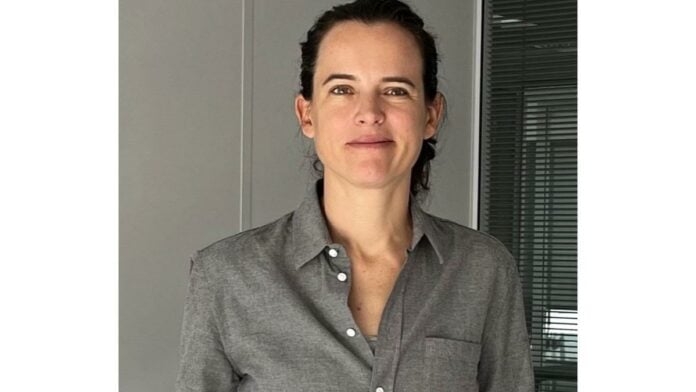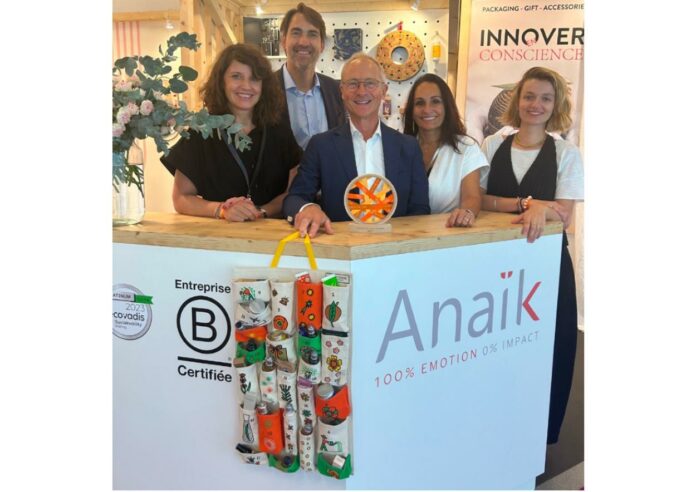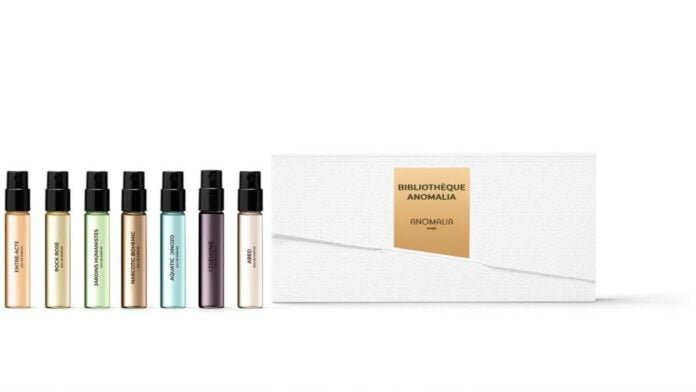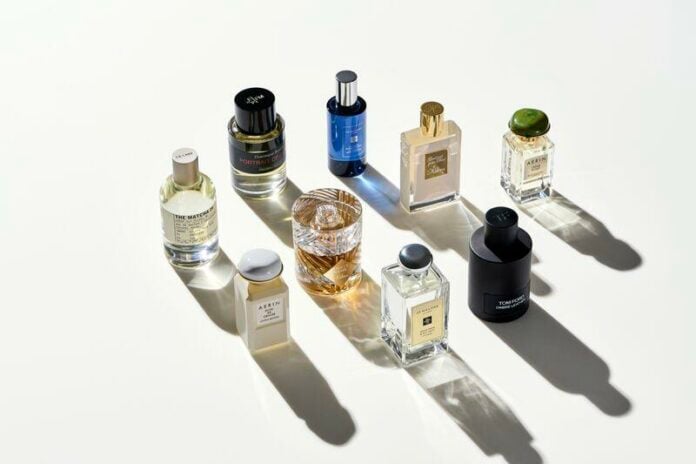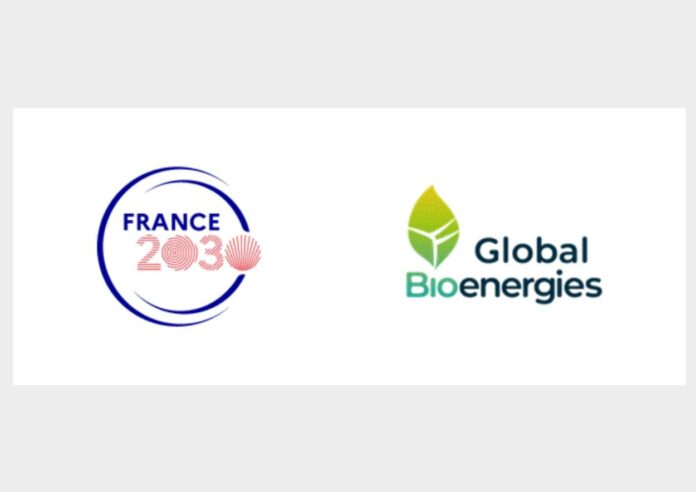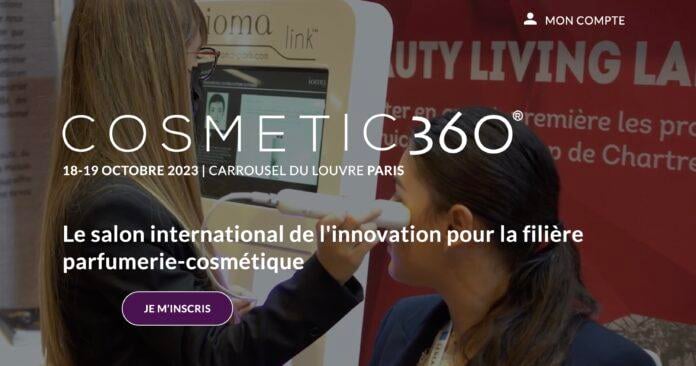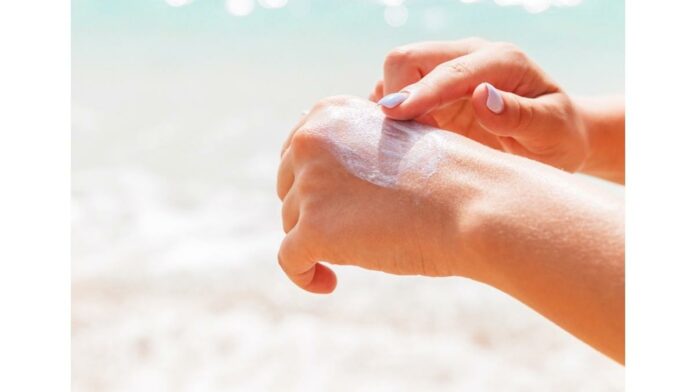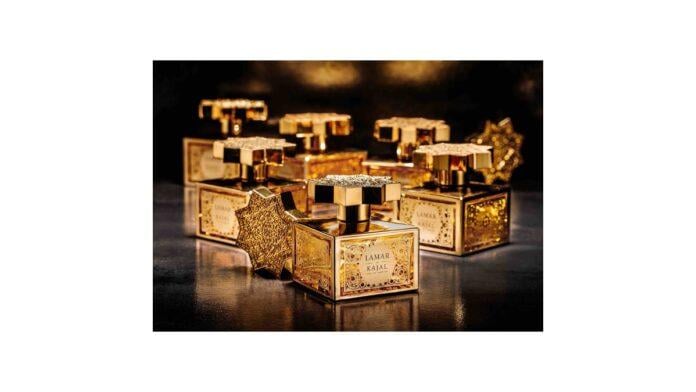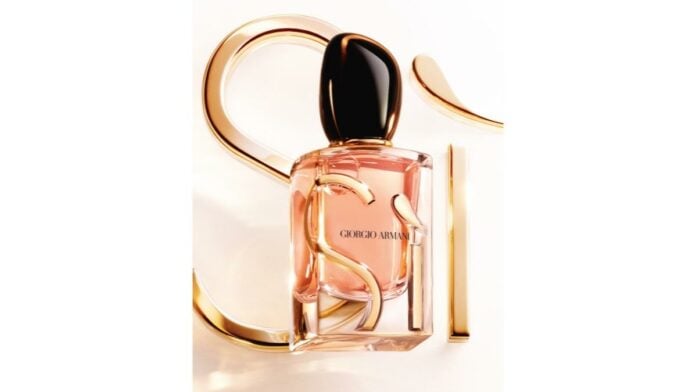Candice Baseden's 17 years' experience in large international organizations, and in particular the last seven years spent in New York as Senior Vice-President of PVH North America and Calvin Klein Global, has enabled her to acquire strong skills in corporate strategy, particularly with regard to business development, operational excellence and innovation.
Working alongside Jean-Marc Venin, Chairman of Ami Ingrédients, Candice Baseden will help bring a new dynamic to the company and build Ami Ingrédients' future with a dual objective: passing on its values and maintaining its business model.
Candice Baseden, new General Manager of Ami Ingrédients
Advent calendar wins Luxe Pack award
Anaïk, a major player in the design and supply of gifts, promotional boxes and accessories for major international brands and retailers, was awarded the Formes de Luxe prize in the "perfume & cosmetics box" category at the Luxe Pack Monaco trade show.
The L'Occitane en Provence x Anaïk textile Advent calendar is an innovative creation for a festive occasion. It allows the brand's universe to shine through, while at the same time making a lasting contribution to the consumer's daily life through its many possible uses.
"We worked on the must-have product for the festive season by creating a festive, practical and reusable Advent calendar. With this packaging we're introducing customers to a more ecological and sustainable way of consuming!"says Sarah Perrin-Mathieu, Anaïk's Open-Innovation Manager.
Produced exclusively for the L'Occitane en Provence brand in 2022, this calendar is made from 65 % recycled cotton. A sustainable alternative to conventional cotton, it recycles cotton scraps from textile production. As a result, it limits the use of water and pesticides associated with conventional cotton production.
This limited-edition product has been designed to become a must-have accessory by transforming itself into a organizer A wall-mounted Advent calendar for the bathroom, office or bedroom, to keep all your favorite products close at hand. It can also be refilled to create your own Advent calendar.
A finely crafted discovery box
Inessens has developed a discovery box for the Anomalia brand. The box, which holds seven 2-ml bottles, is made in France in Grasse, the perfume capital of the world.
Inessens points out that this is not just a discovery box. It was designed specifically for the Anomalia brand, printed in Grasse. Part of it is hand-made.
Offered at the Formes de Luxe prize, on the occasion of the Luxe Pack trade show, this box is made up of three parts: the first is a printed, hot-marked (gold) and embossed sheath for a very haute couture look; the second part is a cut-out, printed, hot-marked (hot gold, pearlescent gilding) and creased pouch. The third part is the wedge.
The shape of the cut-out was specially designed to accommodate the seven Anomalia bottles. Due to the small size of the pouch, gluing and assembly were done by hand.
The box is made on FSC-certified perfume card, a more environmentally-friendly paper because its long fibers intermingle, with no additives in the manufacturing process to disrupt its totally neutral side. The black ink is based on non-GMO vegetable oil. The design is minimalist, with no flat tints. An embossing tool adds animation to the background.
Estée Lauder plans to open a perfumery "Atelier" in Paris
The Estée Lauder Companies (ELC) has announced the creation of an "Atelier" in Paris, a development center designed to boost its innovation and strategic ambitions in luxury and prestige fragrances.
ELC intends to capitalize on the vitality of its fragrance business, whose reported net sales have increased by almost 40 % since the pre-pandemic fiscal 2019. The company, which has recorded 10 consecutive quarters of double-digit organic growth through to the end of fiscal 2023, plans to open a dedicated perfumery "Atelier" in Paris by the end of 2024.
This Atelier will focus exclusively on fragrance innovation and know-how, and will provide global support for ELC's portfolio of fragrance brands, close to partner fragrance houses, ingredient suppliers and its manufacturing network. Led by an agile team of fragrance experts, it will deepen co-creation and collaboration with external partners to accelerate the time-to-market of innovative products, packaging and concepts.
"We are delighted to announce the creation of our new Atelier, said Stéphane de La Faverie, Group Executive Chairman. As a catalyst for innovation across our fragrance portfolio, its location will give us direct access to some of the best creative design resources, industry talent and local suppliers and perfumers, to continue to accelerate our momentum in this exciting category."
ELC's fragrance portfolio includes Jo Malone London, Tom Ford, Estée Lauder, Le Labo, Clinique, Kilian Paris, Editions de Parfums Frédéric Malle, Aerin Beauty, and Aramis.
"ELC's ongoing commitment to its long-term fragrance strategy builds on this extraordinary heritage of creativity and innovation, said Fabrizio Freda, president and CEO. The strength of the company's fragrance portfolio, reinforced by the strategic support of l'Atelier, positions the company well to drive future growth and value in this dynamic and growing category, enabling ELC to continue to bring exceptional luxury and prestige fragrances to consumers around the world."
Some €16.4 million awarded to Global Bioenergies to build its biobased isobutene plant
The French government, via the "First plant" call for projects launched by Bpifrance as part of the France 2030 plan, will contribute to the financing of the 10,000-ton-per-year isobutene and derivatives plant project with non-dilutive financial support of €16.4 million, in the form of a grant (60 %) and a repayable advance (40 %). The plant, designed by Global Bioenergies, a specialist in the conversion of plant resources into chemical compounds, is scheduled to come on stream in 2027.
The unique technology developed by Global Bioenergies, enabling isobutene to be produced from natural resources, will enable the cosmetics industry to enhance the naturalness of its formulas, and aviation industry players to gradually move away from their dependence on oil, without compromising performance and without the need to modify existing equipment and facilities.
Bruno Bonnell, General Secretary for Investment, in charge of France 2030, explains: "In France, Global Bioenergies has developed an innovative process of worldwide scope, representing a new decarbonation solution for various industrial sectors. France 2030 aims to detect, de-risk and support breakthrough technologies."
Marc Delcourt, co-founder and CEO of Global Bioenergies, comments: "This support from the French government is essential, and forms the basis for the overall financing of the plant, which we expect to complete by mid-2024. This plant, which will be located in France, will contribute to the development of abundant local resources, the reindustrialization of the region and the creation of a completely new industry."
Cosmetic 360 opens soon
The Cosmetic 360 trade show will be held on October 18 and 19, 2023 at the Carrousel du Louvre in Paris. More than 220 global innovations will be presented, representing the entire industry.
Explanations from show manager Franckie Béchereau
Cosmoya unveils its suncare formulas at I Feel Good Event
Cosmoya, a cosmetics formulation laboratory, asserted its specialization in the formulation of suncare products at the I Feel Good Event held in Paris, Porte Champerret, on September 19 and 20, 2023.
A sun-focused custom formulation laboratory
This laboratory, created in March 2021 by Marie-Odile Hecht, offers comprehensive support in cosmetic formulation and is aimed at all types of brands to "make their ideas blossom".
With a wealth of experience in suncare products, the company offers a wide range of natural or sensorial formula frames, in all types of galenic formulations.
Cosmoya can also evaluate in vitro SPF of formulas created in the laboratory to save formulation time.
What if making suncare products was no longer a headache?
"Today, formulating products to protect the skin from UV radiation is increasingly complex. We seek to reconcile the irreconcilable. High protection, incredible sensoriality, ease of application, a stable and portable product that is as natural as possible, with no white effect of course, and that scores top marks on all product test applications. At Cosmoya, we are aware of all these challenges, and we offer a made-to-measure service".the company says.
Texen designs the cap for the new men's fragrance Myslf
For the launch of its men's fragrance Myslf, Yves Saint Laurent has opted for ultra-premium refillable packaging. The Texen group was entrusted with the development of a specific cap, with its many technical and aesthetic challenges.
Myslf Eau de Parfum, with its woody fragrance, is available in three formats with identical caps. For this product, Texen continues its long-standing collaboration with the brand, bringing its expertise in the perfume segment and eco-designed solutions.
A turnkey creation
This hood features a remarkably subtle design. It combines streamlined lines with light-and-shadow decorations.
Once the body of the hood and its insert have been injected, each component is decorated and then assembled on line. The finished product is delivered pre-assembled to the brand.
The YSL logo is engraved on the inside of the insert and on the top of the cap, both of which are perfectly aligned with the cap and the front of the bottle.
The magic of decor
Texen's high level of technical expertise is reflected in the aesthetics of the decors, which are based on a low-solvent HES (high-solids-extract) varnish, followed by a pad printing process on the top. This creates a bold contrast between the glossy walls and the matte top, enhanced by an elegant indentation at the corners.
In addition, pad printing hugs the smallest contours of the letters, revealing their relief. Extremely fine grain and ultra-smooth surfaces make the technical complexity of these pieces unimaginable.
Challenge and involvement
From the particularly demanding injection to the decoration stages, Texen has carried out numerous tests and invested in the most advanced processes to achieve a level of quality shared with the L'Oréal development teams (parameterization and adjustment of industrial processes, decoration techniques, camera controls, etc.).
Prad: lasers for "Haute Couture" decors
Kajal Parfumes Paris, known for its luxury fragrances, has opted for French quality, entrusting Prad with Lamar's flamboyant decor.
The Drôme workshops carefully lacquered the square bottle in transparent gold and then metallised it in bright gold.
Laser etching on all four sides reveals the contrasting decor, enhancing transparency and creating reflections.
The name is screen-printed. Lamar is one of the jewels in Kajal's prestigious Classic Collection. The name means "light", "liquid gold". It inspired Mark Buxton to create the fragrance. The famous perfumer created a sensual, rich and natural fragrance with notes of roses and jasmine for "resemble the beauty of a golden sun setting on the horizon."
In 2022, Prad had already decorated the bottles for Kajal's two previous jewels. For Almaz, Prad achieved emerald-transparent lacquering, shiny silver metallization and delicate laser cutting. For Faris, the decoration is a combination of three processes: metallization, laser finishing and silk-screening.
Prad continues to develop its laser technologies to better serve its customers and bring modernity and finesse to their decors.
Photo: © Kajal
Bormioli Luigi designs the bottle for the new Armani Si Intense
The House of Armani has teamed up with Bormioli Luigi to develop a refillable bottle with jewel-like embossed decoration.
Armani has given its Armani Si Intense line a brand-new design and a refillable offer. For this launch, the brand entrusted Bormioli Luigi with the design and development of a bottle in two sizes, 50 and 100 ml, with a screw cap.
Exceptional design
While not breaking with the form of the Si collection, Armani is unveiling a decoration that reveals more than ever the interlacing of its logo. For Bormioli Luigi, it's a new creation incorporating in-mold engraving of the letters on two sides of the bottle, a requirement that focuses on the definition and precision of the motif. While the surface of the glass has the brilliance typical of Armani fragrances, the embossed pattern requires special attention at the re-burning stage.
A logo in gold
The two intertwined letters are revealed by a gold pad-printed decoration made from precious metals. This was a complex operation, particularly at the corners. The name "Giorgio Armani", placed exactly in the center of the facing, is screen-printed in black, a process made delicate by the proximity of the embossed decoration.
With this ultra-premium development, Bormioli Luigi continues its collaboration with the brand and enriches its showcase of refillable products.




